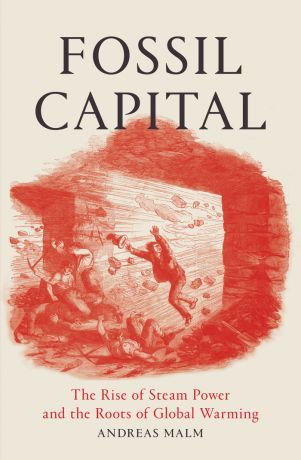Arts
You are here
Fossil Capital and the roots of the climate crisis

August 29, 2017
A review of Fossil Capital: The Rise of Steam Power and the Roots of Global Warming (Verso, 2015) by Andreas Malm
When thinking about the ‘fossil economy’ environmentalists commonly believe that the Industrial Revolution in Britain was the starting point of the sustained growth of emissions from non-renewable energy sources. Environmentalists writing about the concept of the “Anthropocene” to denote a new epoch of unprecedented global human impact on the planet, often attribute the beginning of this period to the mid-1700s with the re-invention of the steam engine, development of factories and machines, chemical manufacturing, and other industrial processes.
These critics say that the technologies of Industrial Revolution accelerated economic growth and explain the rise of fossil fuel consumption, which largely explains the basis of our current climate crisis. Leaving aside debates on the timing of emissions growth, what these critics miss is that root causes of the climate crisis lie in the balance of class forces, as Andreas Malm explains in his book Fossil Capital: The Rise of Steam Power and the Roots of Global Warming (Verso, 2015).
Steam power
Fossil Capital focuses on steam power, a crucial development in the Industrial Revolution. Scottish engineer James Watt’s transformation of the steam engine from a back and forth motion that was used for pumping to a rotating motion suited to industrial applications, significantly improved the efficiency of the steam engine. The transition to steam power, based on coal consumption, led to a plethora of industrial activities, namely rail transport, until oil overtook coal as the world’s ‘favorite’ fuel.
But whereas people usually think that the consumption of coal-based fossil fuels, and thus the roots of the climate crisis, are found in this re-invention of the steam engine, they leave out the complex web of class relations and the organization of labour. In fact, Malm claims that steam power offered neither cheaper nor more abundant energy—but rather superior control over workers’ labour.
Environmentalists usually think the cheapest fuel option always wins over others, but Malm explains that this was not the case with steam power based on coal. Water power was preferable to steam on the basis of lower costs. Schemes for large-scale engineering projects to construct artificial water-power through collectively-owned water reservoirs in the countryside were drafted but mill owners didn’t want to submit to planning, coordination and collective funding required for expansion of water power. Capitalist competition and desire for private property took over.
Steam power over workers
Coal-fired steam power used in factories where workers were "trained to industrious habits" was more advantageous. Factories placed in cities were close to emerging markets where owners could easily recruit workers from the growing unemployed population (meanwhile attacking the Chartist movement to quash trade unions and make it easier to layoff workers), reshape the work rhythm, and take advantage of the super-exploitation of women and children. Steam power was a prime mover that could be "whipped up by its master," taming both nature and workers’ bodies. Malm’s analysis proves that the roots of the proto-fossil fuel economy leading to today’s climate crisis undoubtedly lie in the reorganization of labour for capitalist interests.
Fossil Capital concludes with an indication of how a renewable economy will only occur if it is planned and implemented against private interests whose investments are sunk in fossil fuel industries. Malm’s analysis is falls in line with Marxist thought on labour as a necessary part of material metabolism between people and nature. Only if capitalist relations are overcome will we come closer to restoring the metabolic rift. Until then, capital will always concentrate production at the most profitable sites and where it’s the easiest to subordinate labour.
Section:









